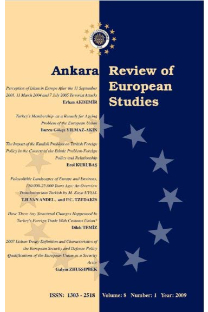TÜRKİYE’NİN ORTA VE DOĞU AVRUPA’DAKİ KARARSIZ MÜTTEFİKLERİ: TÜRKİYE’NİN AVRUPA BİRLİĞİ SÜRECİNE YÖNELİK DESTEĞİN DİNAMİKLERİ
Bu makale Orta ve Doğu Avrupa’da (ODA) yer alan ve Avrupa Birliği’ne (AB) görece yeni üye olmuş ülkelerin siyasi elitlerinin Türkiye’nin AB sürecine yönelik desteklerindeki farklılaşmayı açıklamayı amaçlamaktadır. Makale Türkiye’nin AB’ye tam üye yapılması, müzakere sürecinin ilerletilmesi, durdurulması veya Türkiye ile ilişkilerin mevcut çerçevesinin yeniden tanzimi konularındaki elitlerin görüşlerini inceleyecektir. Bu farklılaşmayı açıklarken, bu ülkelerin stratejik çıkarları, AB’nin genişlemesine yönelik kamuoyları, Türkiye ile siyasi ve ticari ilişkilerinin seyri gibi faktörlerin etkisinden söz edilebilir. Makale özellikle Türkiye’nin ODA ülkeleriyle ikili ilişkilerinin Türkiye’nin AB’deki geleceğine yönelik görüşler üzerinde belirleyici bir etkisi olacağını öngörmektedir.
Anahtar Kelimeler:
Türk dış politikası, Avrupa Birliği, AB genişleme süreci, AB müzakere süreci, Orta ve Doğu Avrupa Ülkeleri
Turkey’s Ambivalent Allies in Central and Eastern Europe: Dynamics of Support for Turkey’s European Union Process
This article seeks to explain the differentiation among the political elites of the new European Union (EU) members from Central and Eastern Europe (CEE) in terms of their support to Turkey’s EU process. The article investigates elite opinions about Turkey’s full membership, continuation or suspension of Turkey’s EU accession negotiations, as well as, the adjustment of the existing framework ofTurkey-EU relations. In explaining such differentiation, one may discuss the impact of the strategic interests of these countries, their public opinion about the EU enlargement, as well as, the progression of their political and trade relations with Turkey. The article expects that especially Turkey’s bilateral relations with the CEE countries should have significant impact over the views concerning Turkey’s futurein the EU.
Keywords:
Turkish foreign policy, European Union, EU enlargement process, EU accession process, Central and Eastern European Countries,
___
- Verveckiene, Liucija, ve Justinas Lingevicius. “FEUTURE EU 28 Country Report: Lithuania.” Erişim Tarihi: Ocak 25, 2018. http://www.feuture.uni- koeln.de/sites/feuture/pdf/Lithuania_28_Country_Report.pdf.
- Usul, Ali Resul. “Is There Any Hope on the Revival of EU–Turkey Relations in the ‘New Era’?” Turkish Studies 15, no 2 (2014): 283-302.
- Uğur, Mehmet. “Open‐Ended Membership Prospect and Commitment Credibility: Explaining the Deadlock in EU–Turkey Accession Negotiations." Journal of Common Market Studies 48, no 4 (2010): 972.
- Turhan, Ebru. “Turkey’s EU Accession Process: Do Member States Matter?” Journal of Contemporary European Studies 24, no 4 (2016): 463-477.
- Taydaş, Zeynep ve Cigdem Kentmen-Cin. “Who Is Afraid of EU Enlargement? A Multilevel Comparative Analysis.” Political Research Quarterly (2017).
- Şatır, Bilgesu. “FEUTURE EU 28 Country Report: Slovakia.” Erişim Tarihi: Ocak 25, 2018. http://www.feuture.uni-koeln.de/eu-28-country-reports/slovakia/.
- Sedelmeier, Ulrich. “Anchoring Democracy from Above? The European Union and Democratic Backsliding in Hungary and Romania after Accession.” Journal of Common Market Studies 52, no 1 (2014): 105-121.
- Müftüler-Baç, Meltem ve Aylin Ece Çiçek. “A Comparison of the European Union’s Accession Negotiations with Bulgaria and Turkey: The Role of Bilateral Issues.” Journal of Contemporary European Studies 25, no 2 (2017): 180-196.
- Müftüler-Baç, Meltem. “Turkey’s Accession to the European Union: The Impact of the EU’s Internal Dynamics.” International Studies Perspectives 9, no 2 (2008): 201-219.
- Mandacı, Nazif. “Avrupa’daki Radikal Sağ Partiler ve Balkanlı Kuzenleri: Çanlar Türkiye İçin Çalıyor.” Uluslararası İlişkiler Dergisi 33, no 9 (2012): 41-71.
- Karakaş, Cemal. “EU–Turkey: Integration without Full Membership or Membership without Full Integration? A Conceptual Framework for Accession Alternatives.” Journal of Common Market Studies 51, no 6 (2013): 1057-1073.
- Jahn, Egbert. “Limits on the Future Expansion of the European Union. On the Disputed Membership of Turkey, Ukraine and Other States.” International Politics (2015): 27-42.
- İçener, Erhan ve David Phinnemore. “Enlargement and the European Union's Absorption Capacity: 'Oft-forgotten' Condition or Additional Obstacle to Membership?” Insight Turkey 8, no 3 (2006): 37-43.
- Hürsoy, Siret. “On the Edge of the EU: Turkey’s Choice between ‘Privileged Partnership’and Non-Accession.” Asia Europe Journal (2017): 1-21.
- Hobolt, Sara. B. “Ever Closer or Ever Wider? Public Attitudes towards Further Enlargement and Integration in the European Union.” Journal of European Public Policy 21, no 5 (2014): 664-680.
- Epstein, Rachel A. ve Wade Jacoby. “Eastern Enlargement Ten Years On: Transcending the East–West Divide?” Journal of Common Market Studies 52, no 1 (2014): 1-16.
- Dimitrova, Antoaneta ve Elitsa Kortenska. “What Do Citizens Want? And Why Does It Matter? Discourses among Citizens as Opportunities and Constraints for EU Enlargement.” Journal of European Public Policy 24, no 2 (2017): 259-277.
- Dimitrova, Antoaneta ve Aron Buzogány. “Post‐Accession Policy‐Making in Bulgaria and Romania: Can Non‐state Actors Use EU Rules to Promote Better Governance?” Journal of Common Market Studies 52, no 1 (2014): 139-156.
- Dimitrova, Antoaneta et. al. “Comparing Discourses about Past and Future EU Enlargements–Core Arguments and Cleavages.” Erişim Tarihi: Ocak 26, 2018. http://www.sps.unimi.it/extfiles/unimidire/28401/attachment/comparing- discourses-about-eu-enlargement-30-april-final.pdf.
- Damian, Alexandru ve Raluca Dinu. “FEUTURE EU 28 Country Report: Romania.” Erişim Tarihi: Ocak 25, 2018. http://www.feuture.uni- koeln.de/sites/feuture/pdf/Romania_28_Country_Report.pdf.
- Bruģe, Ilvija. “FEUTURE EU 28 Country Report: Latvia.” Erişim Tarihi: Ocak 25, 2018. http://www.feuture.uni- koeln.de/sites/feuture/pdf/Latvia_28_Country_Report.pdf.
- Braghiroli, Stefano ve Maili Vilson. “FEUTURE EU 28 Country Report: Estonia.” Erişim Tarihi: Ocak 25, 2018. http://www.feuture.uni- koeln.de/sites/feuture/pdf/Estonia_28_Country_Report.pdf.
- Börzel, Tanja A. et. al. “European Union Enlargement and Integration Capacity: Concepts, Findings, and Policy Implications.” Journal of European Public Policy 24, no 2 (2017): 157-176.
- Bagdonas, Azuolas. “The Geopolitics of Support for Turkey’s EU Accession: A View from Lithuania.” Insight Turkey 14, no 3 (2012): 177-192.
- ISSN: 1303-2518
- Yayın Aralığı: Yılda 2 Sayı
- Başlangıç: 2001
- Yayıncı: Ankara Üniversitesi Avrupa Toplulukları Araştırma ve Uygulama Merkezi
